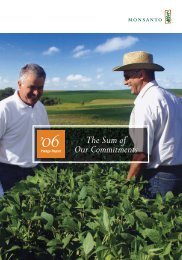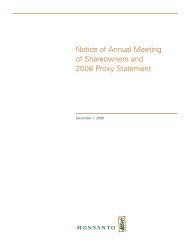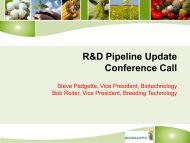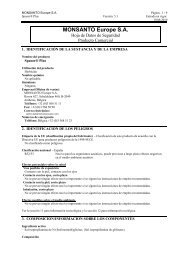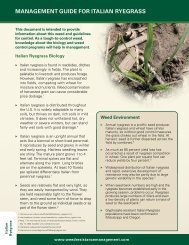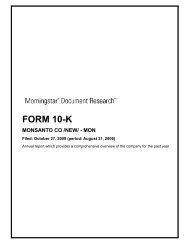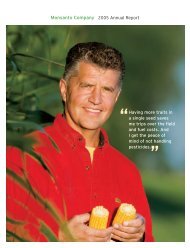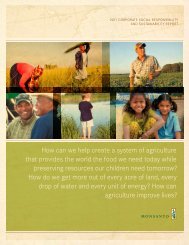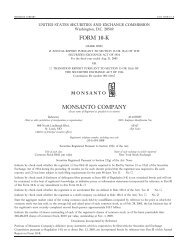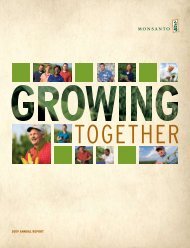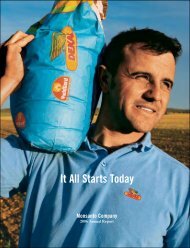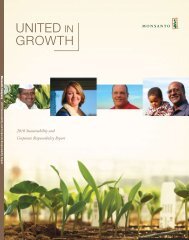Create successful ePaper yourself
Turn your PDF publications into a flip-book with our unique Google optimized e-Paper software.
Under similar drought conditions in a<br />
2003 field trial, the corn with the drought<br />
tolerance gene produced better yields.<br />
CORN WITHOUT GENE CORN WITH GENE<br />
<strong>Monsanto</strong> Pledge Award Winner<br />
Overcoming Drought Impact<br />
Through Crop Conversion<br />
DROUGHT-TOLERANCE TRAITS<br />
IN RESEARCH PIPELINE<br />
A water rights dispute between neighboring states left downstream rice<br />
farmers in Tanjore, India, in a difficult situation. After centuries of raising<br />
paddy rice, these farmers in Tamil Nadu state were forced by drought<br />
conditions to try growing corn, which requires less water. The ultimate<br />
problem turned out to be the lack of a local market for the crop.<br />
New tools being tested by <strong>Monsanto</strong> today show promise to further<br />
increase yields, as well as boost nutritional value, and help plants<br />
to tolerate droughts tomorrow. The company has identified several<br />
genes that enhance a plant’s drought tolerance. This could lead<br />
to crops that are more productive and need less water.<br />
The breakthroughs in drought tolerance have come from<br />
<strong>Monsanto</strong>’s investment in genomics research which is using the<br />
knowledge of plant genomes to identify gene candidates for a<br />
new wave of biotech traits. <strong>Monsanto</strong> has used the Arabidopsis<br />
plant as a model in which to study the genes involved in a plant’s<br />
response to stress. The most successful genes identified in<br />
models are now in crop testing. Results suggest that these genes<br />
can improve crop productivity during a severe-water-stress test.<br />
“The results we’ve seen are extremely exciting,” said Stan<br />
Dotson, <strong>Monsanto</strong>’s director of yield traits research. <strong>Monsanto</strong><br />
is collaborating on drought tolerance with other leading<br />
biotechnology companies, including Mendel Biotechnology,<br />
Paradigm Genetics, and Ceres.<br />
<strong>Monsanto</strong>, searching for a solution, turned to the poultry industry in Tamil Nadu, which feeds chickens<br />
1.2 million tons of corn annually. 15 With the help of the area’s 30 largest poultry producers, an agreement<br />
was reached for them to buy corn from Tamil Nadu growers, thereby creating a local market.<br />
<strong>Monsanto</strong> educated the rice farmers in modern corn cultivation practices and coordinated the poultry<br />
producers’ purchases of the growers’ corn. The program’s goal is to increase the Tanjore corn-producing<br />
area from 3,000 hectares to more than 50,000 hectares.<br />
If this project is successful, its socio-economic impact will be great. It will significantly improve the<br />
lives of Tanjore farmers, and there will be more water to go around.<br />
{ MONSANTO COMPANY 2004 PLEDGE REPORT: PAGES 12-13 }



